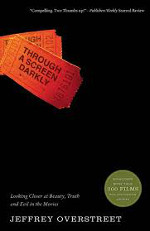
Sometimes when it comes to books about entertainment, it seems like one more tome on the subtle details of Lord of the Rings or the Christian themes in Matrix will break the bookshelf. However, if you enjoy watching movies in any fashion, I strongly recommend you find a copy of Mr. Overstreet’s book Through a Screen Darkly. Even if you have to weed out a few books to make room, it’s worth it.
Most of the books about books or movies take sides. Either they believe their subject is good and that everyone needs to see that way, or they believe it is bad and needs to be shunned by all until it disappears. Through a Screen Darkly happily meanders between the two camps calling for a cease fire. No one movie is focused on. Rather, the topic is the experience of watching movies and how it affects Christians.
I nearly put the book down when the apostle Peter showed up. “Ah. The author believes that all things are permissible, and that there is no such thing as a bad movie. Why read more?” Fortunately, I continued and a few pages later I found myself deeply absorbed in Mr. Overstreet’s personal opinion of the command to Peter. He suggests that the idea of all things being permissible might mean that a movie you think of as bad is really good…for the right person. He acknowledges the obvious point that the goal should always be coming closer to God, and there are films out there so unhealthy they never accomplish this and should be avoided by all. But he suggests that the second clause of “not all things are good” is where our focus should be directed.
Suppose I find myself unable to watch a film like the recent Looper (my example, not his) and watching it would cause me to stumble and draw away from who God wants to me to be. That makes the movie “not good” to me. However, I read reviews from trusted Christian sources praising the movie and the hard themes it forced people to deal with. Instead of using my lens of “not good” to criticism them and demand that they agree with me, I need to recognize that for them, it was good. And since all things are permissible, rather than fighting over my idea of good versus his idea of good, I should acknowledge the good the movie did for that person. Doesn’t ever make it good for me, but it gives the other viewer a platform for thoughts and ideas that are uplifting and glorifying and might not have been achieved otherwise.
I found this the most original and encouraging section of the book, but it was only a section. Many other aspects of the experience of watching movies and how to use those points of agreement of disagreement in dialog and relationship are covered. Movie apologetics aren’t everyone’s cup of tea, but if you have even a cursory interest in the subject, I highly recommended this book. And even if it’s not something you’ve thought too much about before, you might find some of Mr. Overstreet’s hypotheses fascinating.

